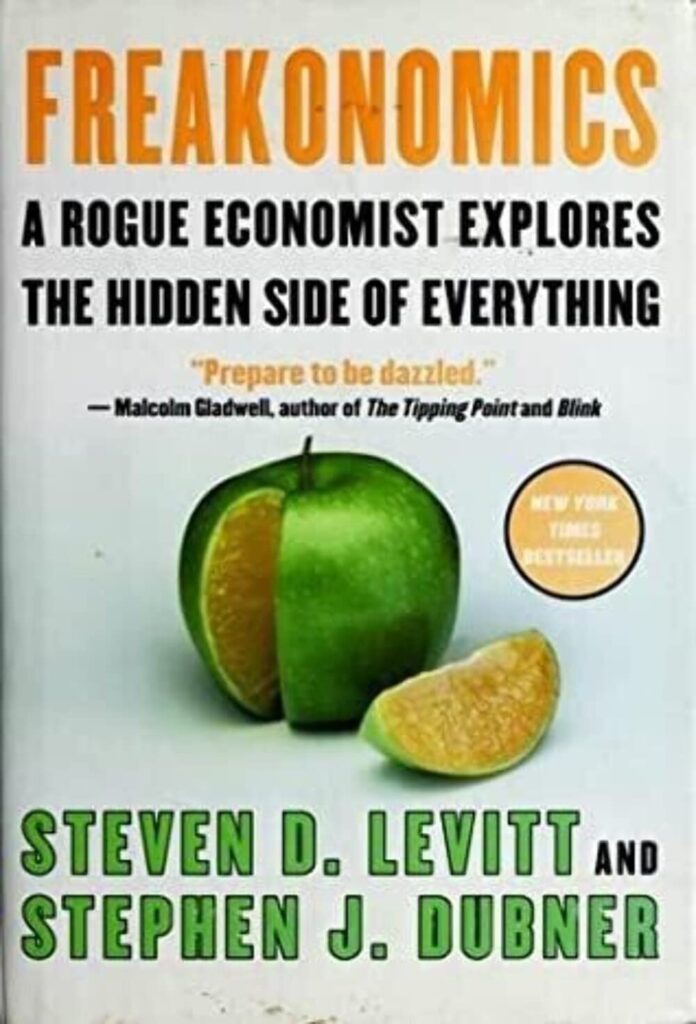I remember the first time I heard the title Freakonomics. I thought, “What on earth is that?” It sounded like a blend of economics and something freaky, something out of the ordinary. Economics, as a subject, can be as dry as a desert. But this book—this book is different. It’s like a splash of cold water on a hot day, waking you up and making you see the world in a whole new light. So, let’s dive into this mind-bending book and see what makes Freakonomics such an eye-opener.
1. Freakonomics: A Whole New Way of Thinking
When you think of economics, what comes to mind? Probably charts, graphs, supply and demand curves, and a lot of dull, monotonous talk about markets. But Steven D. Levitt and Stephen J. Dubner, the authors of Freakonomics, flip the script. They take economics out of the dusty textbooks and put it right in the middle of the real world. And let me tell you, it’s not what you’d expect.
At its core, Freakonomics isn’t just about money or markets. It’s about incentives, the hidden forces that drive our behavior, often in ways we don’t even realize. Levitt and Dubner dig deep into the data, asking the kind of questions that most people wouldn’t even think to ask. They explore everything from crime rates to parenting styles, and what they find is often surprising, sometimes shocking, but always fascinating.
One of the book’s most famous examples is the link between the legalization of abortion and the drop in crime rates in the 1990s. It’s a bold, controversial claim, and it’s backed up by data. The authors argue that unwanted children, who are more likely to grow up in difficult circumstances, are also more likely to turn to crime. By legalizing abortion, the number of unwanted children decreased, leading to a reduction in crime. Whether you agree with the conclusion or not, you have to admit, it’s a perspective that challenges conventional wisdom.

2. The Power of Incentives: What Really Motivates People?
Why do teachers cheat on standardized tests? Why do sumo wrestlers throw matches? What do these two seemingly unrelated questions have in common? The answer lies in incentives.
In Freakonomics, Levitt and Dubner show us that incentives are powerful, often more powerful than we realize. They’re the hidden strings that pull us in one direction or another. And sometimes, those strings are tied to unexpected outcomes.
Take the case of the teachers cheating on standardized tests. You’d think that educators, the people responsible for shaping young minds, would never do such a thing. But when schools are rewarded or punished based on their students’ test scores, the incentive to cheat becomes real. Some teachers, feeling the pressure to perform, end up gaming the system, altering students’ answers to boost scores. It’s not ethical, it’s not right, but it’s understandable when you see the incentives at play.
Similarly, in the world of sumo wrestling—a sport steeped in tradition and honor—there’s a dark underbelly where wrestlers sometimes agree to throw matches. Why? Because the incentives to win or lose at certain times can mean the difference between a promotion or a demotion, between earning more money or losing it. When the stakes are high, even the most honorable traditions can bend under the weight of incentives.
3. Conventional Wisdom: How Often Are We Wrong?
One of the key takeaways from Freakonomics is that conventional wisdom is often wrong. We like to think we know how the world works, but Levitt and Dubner show us that our assumptions can be way off base.
For instance, think about real estate agents. Conventional wisdom tells us that they’ll always get you the best deal because it’s in their best interest to do so. After all, they earn a commission on the sale, right? But Freakonomics reveals that this isn’t entirely true. When selling their own homes, real estate agents tend to hold out for a better offer, but when selling yours, they might encourage you to take the first decent offer that comes along. Why? Because the marginal increase in their commission isn’t worth the extra time and effort for them. So, what’s good for them might not be what’s best for you.
Another example is crime. In the 1990s, many people believed that crime rates dropped because of tougher policing, longer prison sentences, and a booming economy. But Levitt and Dubner argue that one of the biggest factors was something no one expected: the legalization of abortion two decades earlier. It’s a controversial and uncomfortable idea, but it’s backed by data that makes you rethink what you thought you knew about crime and its causes.
4. The Hidden Side of Everything: What Freakonomics Teaches Us About the World
What Freakonomics does best is peel back the layers of the world we think we know and reveal the hidden side of everything. It’s a book that makes you question, makes you think, and sometimes makes you a little uncomfortable. And that’s a good thing.
The beauty of Freakonomics is that it doesn’t just give you answers; it gives you new ways to ask questions. It encourages curiosity, challenges assumptions, and shows that the world is far more complex and interconnected than we often realize.
One of the final lessons of the book is that correlation does not imply causation. Just because two things happen together doesn’t mean one caused the other. It’s a simple concept, but one that’s often overlooked in everyday thinking. Levitt and Dubner drive this point home with countless examples, reminding us to dig deeper, to question more, and to never take things at face value.
Conclusion: What Do You Think?
So, what’s the takeaway from Freakonomics? For me, it’s that the world is full of surprises, and things are rarely as simple as they seem. It’s a reminder that our actions are driven by incentives, that conventional wisdom can be misleading, and that there’s always a hidden side to everything.
But what about you? How do you see the world differently after hearing about Freakonomics? What assumptions in your life might be worth reexamining? Let’s keep the conversation going—what hidden truths are waiting to be discovered in your everyday life?




